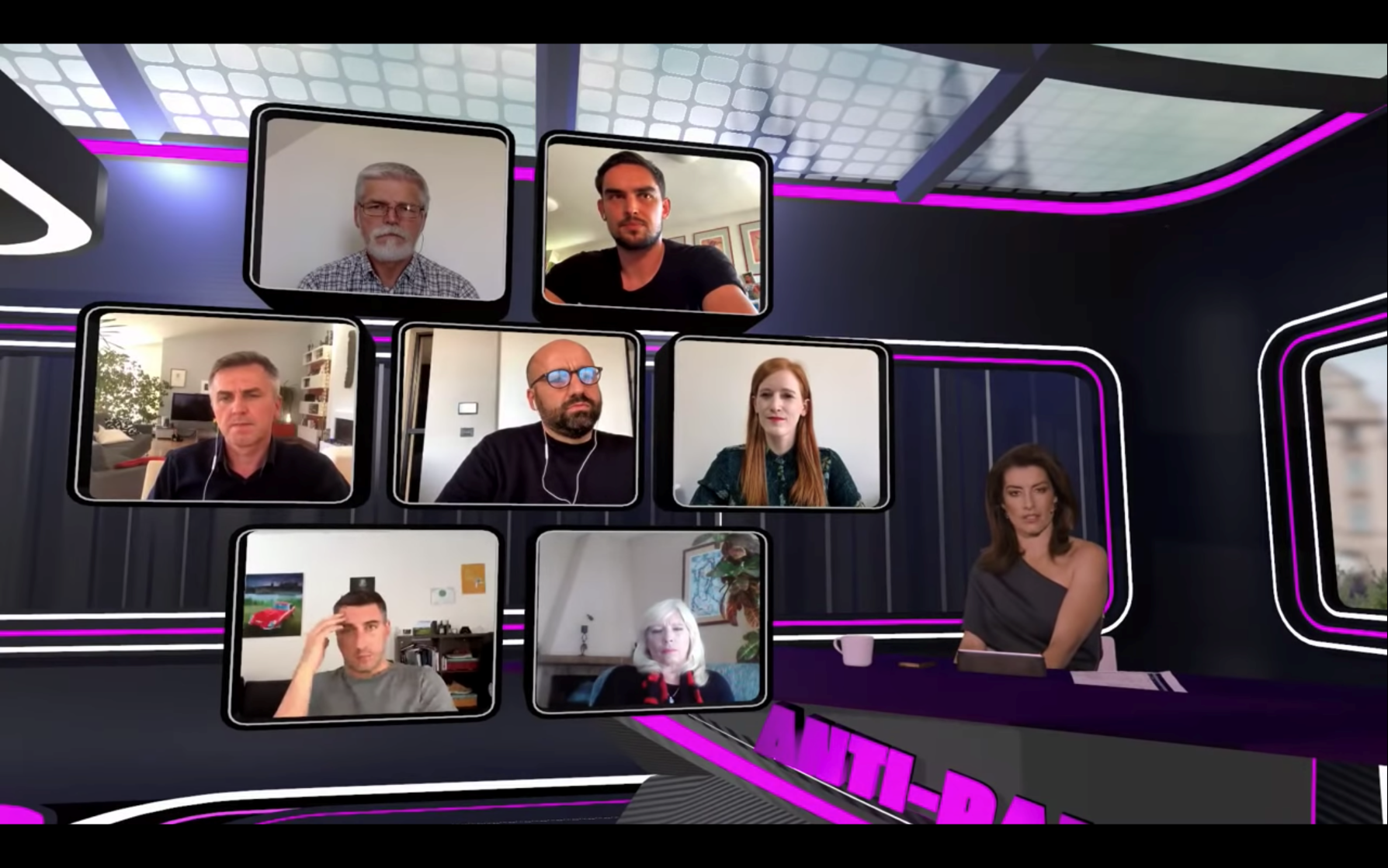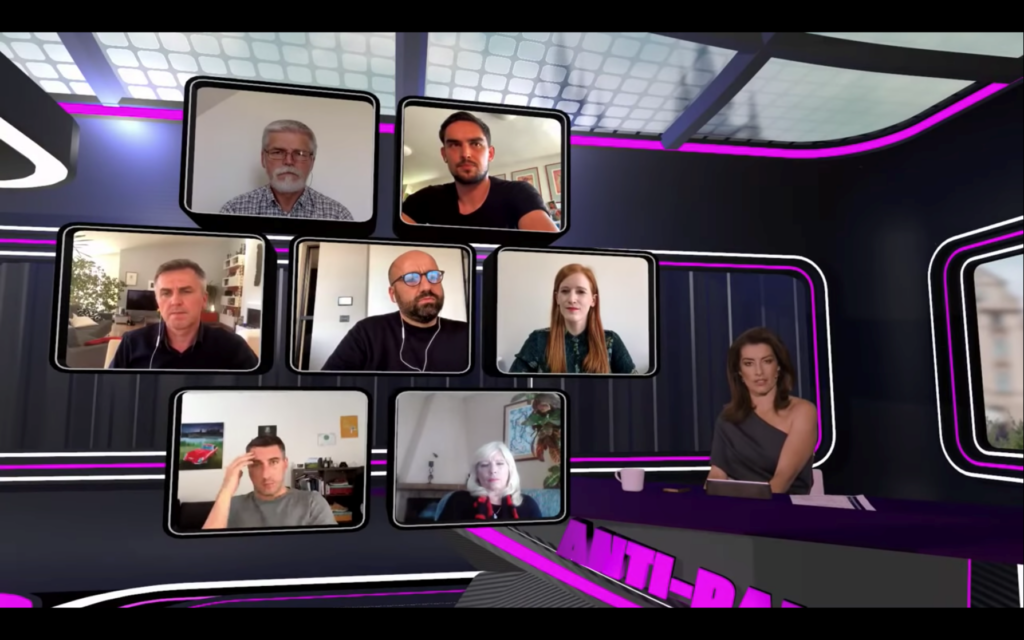The participants of the additional edition of the Anti-Panic Conference 2.0 have agreed that the gravest current threats are disinformation and fear.
The live stream conference, organized jointly by Aspen Institute CE, JAD Production and Unicorn Attacks with the support of Česká spořitelna and Hospodářské noviny, has once again offered different perspectives on the impacts as well challenges and prospects brought upon our society by the current crisis. In addition to the 7 speakers, the discussion platform expanded to include direct input from the Essential 100 panel and the opportunity for more than 10,000 participants from the general public to vote on matters related to priorities, threats and restrictions linked to the corona crisis.
The role of speakers at the Anti-Panic Conference 2.0 was undertaken by representatives of the business community, governmental and non-profit organizations as well as representatives of the world of sports. The speakers that contributed included: the entrepreneur Tomáš Čupr (Rohlík.cz), the restaurateur Riccardo Lucque (La Collezione group), manager and corporate leader Milan Vašina (Aspen Institute Central Europe), General Petr Pavel (Stronger Together), Doctor Kateřina Vacková (Loono) and the Czech representative in the NBA basketball league Tomáš Satoranský. Experience from beyond the Czech borders was represented by the former Prime Minister of Slovakia, the sociologist Iveta Radičová. The conference was moderated by Michala Hergetová.
The main output of the two-hour discussion was a reflection on the current situation by the speakers but also the results of voting on 3 raised questions:
1. What should be one particular priority for leaders within their organizations until the current situation stabilizes?
2. What is bringing about difficulties in decision-making for people and entrepreneurs?
3. What is the current greatest threat?
Both the present speakers, together with the group of 100 Essentials consisting of invited personalities from the world of business, economics or science as well as a group of registered representatives of the greater public, could vote in the form of a poll. The opinions of both groups were very similar.
The final voting results of the 7 speakers and the 100 Essentials group showed that keeping key people in their positions should be a priority for leaders (79%), followed by digitization of companies (18%) and keeping costs to a minimum (3%).
According to the participants, the main reason causing entrepreneurs difficulties in decision-making is the media, which is misusing coronavirus data and is making a “reality show” out of it (42%). The next established reason is the interpretation of coronavirus data by political leaders with the intention of causing fear (32%). Some believe that correct data on coronavirus do not exist (21%) or even that decision-makers do not actually follow the available information (5%).
The group saw the greatest threat in restriction of freedom (46%), followed by political populism (37%), a lesser percent in the restriction of entrepreneurship (10%) or the spread of the virus itself (7%).
What are the recommendations that follow from the Anti-Panic 2.0 conference?
Society has a clear objective which is far more resilient to external shocks and is able to accept change more flexibly. People have experienced everyday life differently, a shift in consumer behavior, traveling is no longer unknown and a change in thinking is possible.
The key question, to which the answer is not yet clear, is: Whether and how quickly a return to the lifestyle before the pandemic is possible or is it necessary to adapt our way of life and do business in the new situation?
The anticipated digitization in industry will accelerate and new ways of working will need to learned. In sectors that depend on the movement of people (tourism) and goods (global supply chains), the way of doing business will change, especially for strategically important products, where a shift in production from areas of cheap labor to domestic manufacturers may occur. Regard for the environment has not been side-lined, most companies consider it an important factor for the restarting of the economy.
In many areas of life, the pandemic and the follow-up measures have accelerated “learning on the go” – doctors, teachers, everyone on the front lines; new professions have mastered working remotely. The government and self-governing bodies should support this dynamic, especially in the functioning of the public administration.
Government policies should maintain an open space for the talents and creators that have mobilized themselves during the pandemic, and uphold their energy by identifying areas of strategic importance that it will support long-term (ex. Cybersecurity, nanotechnology).
Regard for the environment should be an important parameter of the economic restart. Government economic incentives should also help reduce the risks of climate change, including the current scarcity of water in nature.
The government and parliament should evaluate the course of the crisis thus far, not only on the basis of analysis of the taken measures and their impact, but also in terms of data collection and usage, involvement of expert teams and strategic communication with the public.
The analysis could capture ideas and well-meaning initiatives that for some reason have not been executed and identify their weaknesses and conversely, allow promising projects that have been realized to expand and grow, thus supporting the economic recovery as a way out of the crisis.
Supra-national institutions have been side-lined. The Czech Republic is vitally dependent on international cooperation and maintaining the movement of goods and people within the EU.
In the case where individual states within the EU do not act in a coordinated manner, the task of the government is to strive for the greatest possible degree of coordination in the uncoordinated areas and prevent the creation of barriers on a global level. All this places great demands upon the governing style and management. Political leaders should take into consideration the fact that most responders consider restrictions of freedom and political populism to be a far greater threat than the spread of the virus itself.
In addition to keynote speakers, Lukáš Kovanda, an economist and member of NERV, as well as Filip Matějka, an economist and member of the government’s Central Crisis Staff, also joined the conference.
The team around Yemi AD, Milan Šemelák and Vít Šubert, who are behind the concept of the Anti-Panic platform, together with Aspen Institute Central Europe and other partners, are already planning another edition, this time with the subtitle 3.0, which will take place on June 9, 2020 with the possibility to participate for every registered participant at www.antipanic.live.


